Joint MR Image Reconstruction and Super-Resolution via Mutual Co-Attention Network
IF 4.8
2区 工程技术
Q1 COMPUTER SCIENCE, INTERDISCIPLINARY APPLICATIONS
引用次数: 0
Abstract
In the realm of medical diagnosis, recent strides in Deep Neural Network-guided Magnetic Resonance Imaging (MRI) restoration have shown promise. Nevertheless, persistent drawbacks overshadow these advancements. Challenges persist in balancing acquisition speed and image quality, while existing methods primarily focus on singular tasks like MRI reconstruction or super-resolution, neglecting the interplay between these tasks. To tackle these challenges, this paper introduces the Mutual Co-Attention Network (MCAN) specifically designed to concurrently address both MRI reconstruction and super-resolution tasks. Comprising multiple Mutual Cooperation Attention Blocks (MCABs) in succession, MCAN is tailored to maintain consistency between local physiological details and global anatomical structures. The intricately crafted MCAB includes a feature extraction block, a local attention block, and a global attention block. Additionally, to ensure data fidelity without compromising acquired data, we propose the Channel-wise Data Consistency (CDC) block. Thorough experimentation on the IXI and fastMRI dataset showcases MCAN’s superiority over existing state-of-the-art methods. Both quantitative metrics and visual quality assessments validate the enhanced performance of MCAN in MRI restoration. The findings underscore MCAN’s potential in significantly advancing therapeutic applications. By mitigating the trade-off between acquisition speed and image quality while simultaneously addressing both MRI reconstruction and super-resolution tasks, MCAN emerges as a promising solution in the domain of MR image restoration.通过相互协作网络实现联合磁共振图像重建和超分辨率
在医学诊断领域,深度神经网络引导的磁共振成像(MRI)修复技术最近取得了长足进步,前景广阔。然而,持续存在的缺陷给这些进步蒙上了阴影。在平衡采集速度和图像质量方面一直存在挑战,而现有方法主要关注磁共振成像重建或超分辨率等单一任务,忽视了这些任务之间的相互作用。为了应对这些挑战,本文介绍了专为同时解决磁共振成像重建和超分辨率任务而设计的相互协作注意力网络(MCAN)。MCAN 由多个连续的相互协作注意区块(MCAB)组成,旨在保持局部生理细节与整体解剖结构之间的一致性。精心设计的 MCAB 包括一个特征提取块、一个局部注意块和一个全局注意块。此外,为了确保数据的保真度,同时不影响已获取的数据,我们提出了通道数据一致性(CDC)块。在 IXI 和 fastMRI 数据集上进行的全面实验表明,MCAN 优于现有的先进方法。定量指标和视觉质量评估都验证了 MCAN 在磁共振成像修复中的增强性能。这些发现凸显了 MCAN 在显著推进治疗应用方面的潜力。MCAN 可减轻采集速度和图像质量之间的权衡,同时解决磁共振成像重建和超分辨率任务,是磁共振图像复原领域前景广阔的解决方案。
本文章由计算机程序翻译,如有差异,请以英文原文为准。
求助全文
约1分钟内获得全文
求助全文
来源期刊

Journal of Computational Design and Engineering
Computer Science-Human-Computer Interaction
CiteScore
7.70
自引率
20.40%
发文量
125
期刊介绍:
Journal of Computational Design and Engineering is an international journal that aims to provide academia and industry with a venue for rapid publication of research papers reporting innovative computational methods and applications to achieve a major breakthrough, practical improvements, and bold new research directions within a wide range of design and engineering:
• Theory and its progress in computational advancement for design and engineering
• Development of computational framework to support large scale design and engineering
• Interaction issues among human, designed artifacts, and systems
• Knowledge-intensive technologies for intelligent and sustainable systems
• Emerging technology and convergence of technology fields presented with convincing design examples
• Educational issues for academia, practitioners, and future generation
• Proposal on new research directions as well as survey and retrospectives on mature field.
 求助内容:
求助内容: 应助结果提醒方式:
应助结果提醒方式:


